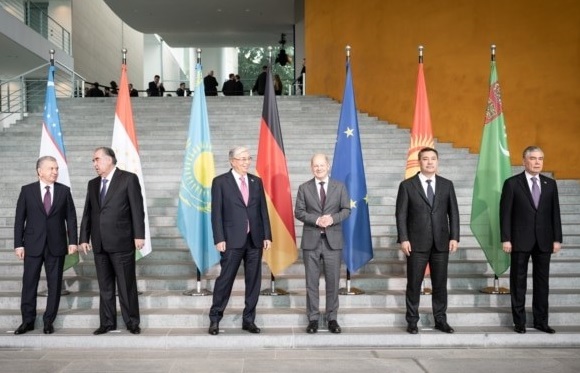German Chancellor Scholz's visit to Central Asia
A trip that marks how much the interest of the Germans and the entire European Union in the region has increased, especially on the issue of an alternative trade corridor to Moscow. But many companies are extremely cautious about investments, frightened by the economic damage done by the war in Ukraine and by a local context in which corruption dominates.
Astana (AsiaNews) - German Chancellor Olaf Scholz made his first official visit to Tashkent and Astana, where he met with the leaders of all the Central Asian countries in the ‘5+1’ format, the second of its kind after welcoming the five presidents to Germany last year. Against the backdrop of Russia's local and global war, the interest of the Germans and the entire European Union in this crucial region has clearly increased.
As the expert of the German Foreign Policy Association, Stefan Meister, confirms to Azattyk, ‘the main interest lies in the search for new partners for natural resources, oil, gas and rare materials’. Germany is ready to invest considerable resources in this direction, although after the Berlin summit in 2023 the Central Asians were rather disappointed, as they are still waiting for the realisation of the projects that were put on the table at the first meeting.
However, Scholz's trip shows the willingness of European leaders to continue dialogue and cooperation with these countries, especially on the economy and migrant issues. The German Chancellor was accompanied by a large delegation of businessmen, which made the summit much more promising for real business development and prospects for the Central Asians, considering that the German economy until two years ago depended heavily on Russian gas and other raw materials that can be found in this area.
The most important long-term investments will certainly concern the alternative trade corridor to Asia and China, via Central Asia, South Caucasus and the Black Sea. All European countries, international banks, and technology and infrastructure market players are interested in this. ‘It will take a long time,’ Meister comments, as ‘investment conditions in Central Asia have not improved, and there is a lack of legal certainty above authoritarian arbitrariness’. Many companies are extremely cautious, also considering the trauma of the huge losses in the Russian market closure, and the persistence of extensive corruption in these countries.
According to the political scientist, it must be considered that ‘Scholz is not a very influential leader in Europe, especially in the context of this war’, and he does not have the ability to engage the Central Asian heads of state and government effectively and continuously, which would be indispensable given that these countries are administered ‘from the top down’. Moreover, even compared to his predecessor Angela Merkel, Scholz ‘is not very attentive to the issue of human rights’. The issues of migrants and their rights were nevertheless addressed at the summit, even if it remains ‘a secondary issue’, says Meister.
However, the shadow of the Russian threat remains over everything, as Kazakh President Kasym-Žomart Tokaev mentioned during the Astana meeting, stating that ‘a further escalation of the Russian-Ukrainian war could lead to irreparable consequences’. Asked by Scholz himself about the issue, Tokaev replied that ‘it is a fact that Russia in the military field is invincible’, and from this ‘all of humanity is threatened, and especially the countries most involved in the conflict between Moscow and Kiev’. The Kazakh leader still considers peace talks possible, although ‘many opportunities have been lost’, starting with the possible Istanbul agreement.
Tokaev also noted that ‘heads of state come and go, and therefore neighbouring peoples must live in peace and mutual understanding’, recalling that the longest land border in the world stretches between Russia and Kazakhstan. Kazakhstan has always maintained ‘very friendly relations even with Ukraine and its original culture’, but everything suggests that ‘Putin has no intention of stopping’.
24/10/2019 17:56







.png)










